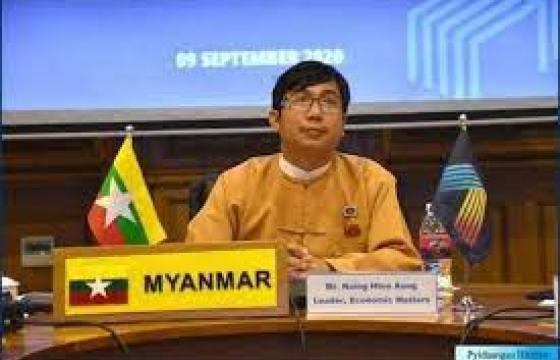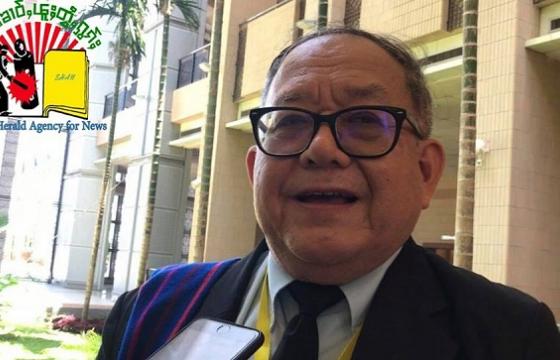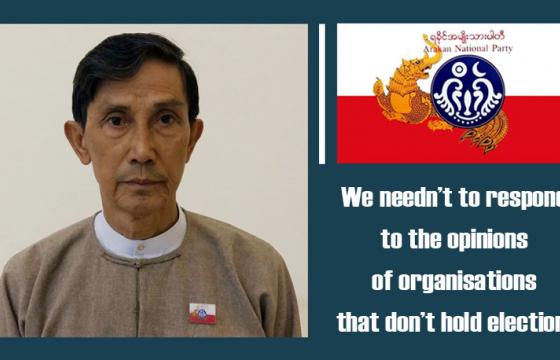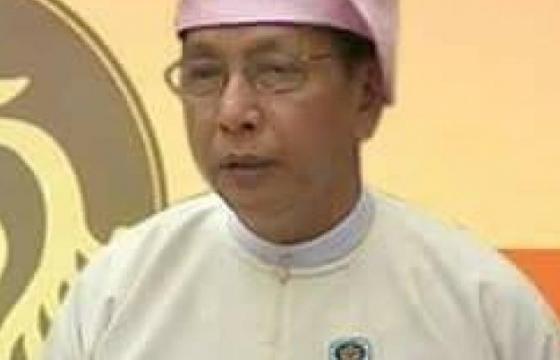The Asian Development Bank (ADB) launched its Asian Outlook 2016 report last week, which called for the economy to grow around 8.4 percent this fiscal year. The report is an assessment and prediction on Myanmar’ 2016 economy and the challenges it faces. Overall, it predicts economic growth will recover and inflation will moderate in the 2016 fiscal year.
The newly formed democratic government will face challenges in areas of economic reform, financing infrastructure improvements, overcoming labor shortages, and establishing peace and social cohesion, says the ADB report.
Peter Brimble, the deputy country director of ADB Myanmar, talks about the bank’s report in an exclusive Mizzima interview:
Mizzima: What are the bank’s budget projections for 2016-17 compared to fiscal year 2015?
Brimble: We feel optimistic. Last year, there were clearly challenges due to the flooding, the election cycle and political issues. The economic growth in 2015 was only 7.2 percent, which is quite low for Myanmar. The China slowdown had some impact. We’re looking forward to an agriculture sector recovery and a positive political transition. The economy growth in 2016 should come in around 8.4 percent.
M: How does Myanmar’s economy look in regards to China, India and the ASEAN countries?
Brimble: We looked at the countries around Myanmar. China is facing an economic slowdown, and it will have some negative impact on growth in Myanmar but when we look at India and ASEAN, we see both of those regions performing quite strongly in 2016-2017. Myanmar will benefit if it can strengthen linkages with neighboring regions, especially Thailand, and the other ASEAN economies, and India. My guess is that it will continue to integrate with China, but not with the high expectations of the past.
M: Infrastructure sectors such as electricity, human resources and transportation connectivity are major challenges for the private sector. How should the government approach the needed upgrades?
Brimble: Clearly, the demand for improved infrastructure in Myanmar is very high. We estimate that between now and 2030 about $120 billion is needed. This can only partly be financed by development partners such as the World Bank and various government funds, so Myanmar will need to identify private sources to finance some of the projects. It will be challenged to develop a business climate that is open and transparent and that can attract foreign investors to come in and help build power plants or toll-roads or ports, and other things like that, and then it must free-up government funding for education and other social sector expenditures.
M: Your report also looks at Myanmar’s macroeconomic challenges.
Brimble: The issue is clearly to maintain fiscal stability to ensure the deficit is reasonable, less than 5 percent to begin, and to take a more proactive role in inflation management. It will require strengthening the autonomy and the tools available to the central bank of Myanmar and to carefully build up international reserves to create a buffer in case of external shocks. We mentioned explicitly the importance of allowing the exchange rate to be flexible to enable the economy to be more responsive to international shocks and not to draw down international reserves too much. Myanmar has the standard challenges that any economy growing quickly would face.
M: Ethnic issues, which include ethnic armed conflict, create risks to macroeconomic prospects. What role will such issues play in economic development?
Brimble: For all investors,the stability of the country is clearly important. It’s a basic condition for foreign investors to come into the country.
M: Peace in ethnic areas are really fundamental to developing the social framework that will boost the overall economy in those areas, right?
Peter: This is the big agenda: to improve the legal and regulatory framework for foreign investment and the private sector. I mean corporate law is very important as a first step. And I think the country will need to focus on education and training. This is really critical.For foreign companies now operating in Myanmar this is a No.1 problem. The financial sector needs to develop to provide finance. I think private investments will come in to do these things and to provide services to the private sector. I think, as that happens, the foreign investment will lead to increased jobs, higher incomes and increased exports and so on, and this will assist the macroeconomic stability of Myanmar.
M: Inflation ticked up around 11 percent in 2015. What tools are available to fight inflation?
Brimble: I think development depends on economic growth, on inflationary pressure, but also on credit to the private sector, which has been growing very fast. The government does not have many tools to control inflation, such as interest policy to draw liquidity out of the market, to raise government revenue rather than issue money. I mean right now the government issues new money to cover the budget deficit.
M: How will the country’s external debt effect Myanmar’s economic growth?
B: I think the International Monetary Fund(IMF) has done a careful evaluation of Myanmar’s public debt and it concludes that 15 percent of GDP is quite sustainable. The Asian Development Bank, in fact, has been working with the Ministry of Finance to develop the public debt management unit and the public debt management law and these are now in place so we feel quite confident that there is not a serious public debt concern now.
The government needs to identify private sector sources of funding for some infrastructure improvement that does not affect the public debt. If the government borrows a lot from other countries, such as China or wherever, it might have some impact on the public debt situation.
M: How do you see the Myanmar economy growing in the near term?
Brimble: I would look forward to a growth rate of around 8 percent until 2030.







